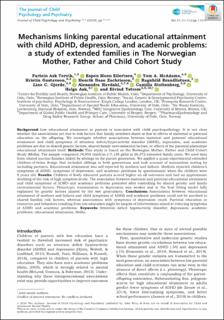Mechanisms linking parental educational attainment with child ADHD, depression, and academic problems: a study of extended families in The Norwegian Mother, Father and Child Cohort Study
Torvik, Fartein Ask; Eilertsen, Espen Moen; McAdams, Tom A.; Gustavson, Kristin; Zachrisson, Henrik Daae; Brandlistuen, Ragnhild Eek; Gjerde, Line C.; Havdahl, Alexandra; Stoltenberg, Camilla; Ask, Helga; Ystrøm, Eivind
Journal article, Peer reviewed
Published version

Åpne
Permanent lenke
https://hdl.handle.net/11250/2726678Utgivelsesdato
2020Metadata
Vis full innførselSamlinger
Originalversjon
10.1111/jcpp.13197Sammendrag
Background:
Low educational attainment in parents is associated with child psychopathology. It is not clear whether the associations are due to risk factors that family members share or due to effects of maternal or paternal education on the offspring. We investigate whether associations between maternal and paternal educational attainment and child symptoms of attention deficit/hyperactivity disorder (ADHD), depression, and academic problems are due to shared genetic factors, shared family environmental factors, or effects of the parental phenotype educational attainment itself.
Methods:
This study is based on the Norwegian Mother, Father and Child Cohort Study (MoBa). The sample comprised 34,958 children (17,128 girls) in 28,372 extended‐family units. We used data from related nuclear families linked by siblings in the parent generation. We applied a quasi‐experimental extended children‐of‐twins design that included siblings in both generations and took account of nonrandom mating by including partners. Educational attainment was self‐reported by mothers and fathers. Mothers reported children's symptoms of ADHD, symptoms of depression, and academic problems by questionnaire when the children were 8 years old.
Results:
Children of lowly educated parents scored higher on all outcomes and had an approximate doubling of the risk of high symptom levels. The association between maternal and paternal educational attainment and child symptoms of ADHD and academic problems persisted after controlling for shared genetic and family environmental factors. Phenotypic transmission to depression was weaker and in the best fitting model fully explained by genetic factors shared by the two generations.
Conclusions:
Associations between educational attainment of mothers and fathers and child symptoms of ADHD and academic problems could not be ascribed to shared familial risk factors, whereas associations with symptoms of depression could. Parental education or resources and behaviors resulting from low education might be targets of interventions aimed at reducing symptoms of ADHD and academic problems.
